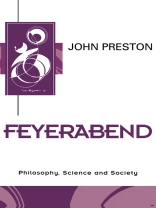This book is the first comprehensive critical study of the work of
Paul Feyerabend, one of the foremost twentieth-century philosophers
of science.
The book traces the evolution of Feyerabend’s thought, beginning
with his early attempt to graft insights from Wittgenstein’s
conception of meaning onto Popper’s falsificationist philosophy.
The key elements of Feyerabend’s model of the acquisition of
knowledge are identified and critically evaluated. Feyerabend’s
early work emerges as a continuation of Popper’s philosophy of
science, rather than as a contribution to the historical approach
to science with which he is usually associated.
In his more notorious later work, Feyerabend claimed that there
was, and should be, no such thing as the scientific method. The
roots of Feyerabend’s ‘epistemological anarchism’ are exposed and
the weaknesses of his cultural relativism are brought out.
Throughout the book, Preston discusses the influence of
Feyerabend’s thought on contemporary philosophers and traces his
stimulating but divided legacy. The book will be of interest to
students of philosophy, methodology, and the social sciences.
Mục lục
Preface.
Acknowledgements.
Notes on References.
Introduction: Feyerabend’s Life and Work.
1. Philosophy and the Aim of Science.
2. Meaning: The Attack on Positivism.
3. Theories of Observation.
4. Scientific Realism and Instrumentalism.
5. Theoretical Monism.
6. Incommensurability.
7. Theoretical Pluralism.
8. Materialism.
9. Science without Method.
10. Relativism, Rationalism and a Free Society.
Notes.
Bibliography.
Index.
Giới thiệu về tác giả
John Preston is Lecturer in Philosophy at the University of Reading.












